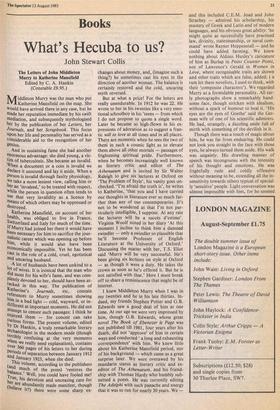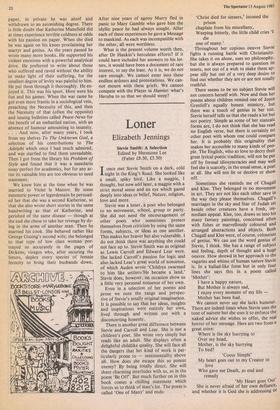Books
What's Hecuba to us?
John Stewart Collis
The Letters of John Middleton Murry to Katherine Mansfield Edited by C. A. Hankin (Constable £9.95.)
Middleton Murry was the man who put Katherine Mansfield on the map. She would have arrived there in any case, but he made her reputation immediate by his swift Mediation, and subsequently mythologised her by the publication of her Letters, her Journals, and her Scrapbook. This focus upon her life and personality has served as a considerable aid to the recognition of her genius.
And in sustaining fame she had another enormous advantage: she died young, a vic- tim of tuberculosis. She became an invalid. When a document or a coin is invalid we declare it unsound and lay it aside. When a. Person is invalid through faulty physiology, we take a more lenient view, calling him or her an Invaleed,' to be treated with respect, while the person in question often tends to use that very invalidity as a licence by means of which others may be oppressed or destroyed.
Katherine Mansfield, on account of her health, was obliged to live in France, Switzerland and Italy for much of the time. If Murry had joined her there it would have been necessary for him to sacrifice the jour- nalistic career which was opening up before him, while it would also have been economically impossible. Yet he has been cast in the role of a cold, cruel, egotistical and uncaring husband. A lot of husbands have been unkind to a 101 of wives. It is ironical that the man who did most for his wife's fame, and was com- Pletely devoted to her, should have been at- tacked in this way. The publication of Katherine's Journals, etc, contain references to Murry sometimes showing him in a bad light — cold, wayward, or in- different at important moments. He did not attempt to censor such passages: I think he enjoyed them — for conceit can take curious forms. The present volume, edited by Hankin, a truly remarkable literary archaeologist in the modern mode (though terribly confusing at the very moments when we really need explanation), contains over 360 pages of his letters to her during Periods of separation between January 1912 and January 1923, when she died. This volume, according to the publishers 3(and much of the press) `restores the alance.' Well, you could have fooled me! Th rue, his devotion and unceasing care for er are abundantly made manifest, though (believe it?) there were some sharp ex-
changes about money, and, (imagine such a thing?) he sometimes cast his eyes in the direction of another woman. The balance is certainly restored and the cold, uncaring myth reversed.
But at what a price! For the letters are really unendurable. In 1912 he was 22. He wrote to her in his twenties like a very emo- tional schoolboy in his 'teens — from which I do not propose to quote a single word. Later he became so high-flown in his ex- pressions of adoration as to suggest a fran- tic will to love at all times and in all places. There are moments when he sees the two of theni in such a cosmic light as to elevate them above all other mortals — passages of frightening spiritual pride. Furthermore, when he becomes increasingly well known as literary critic and editor of The Athenaeum and is invited by Sir Walter Raleigh to give six lectures at Oxford on `The Problem of Style', his vanity goes un- checked..`I'm afraid the truth is', he writes to Katherine, 'that you and I have carried our thoughts in literature ever so much far- ther than any of our contemporaries. It's not to be wondered at that I'm not par- ticularly intelligible, 1 suppose. At any rate the lectures will be a succes d'estime'. Virginia Woolf noted in her diary 'At this moment I incline to think him a damned swindler — only a swindler so plausible that he'll become Professor of English Literature at the University of Oxford.' Discussing the matter with her, T.S. Eliot said 'Murry will be very successful. He's been giving six lectures on style at Oxford — as though it were a duty. He takes the crown as soon as he's offered it. But he is not satisfied with that.' Here I must break off to share a reminiscence that might be of interest.
I knew Middleton Murry when I was in my twenties and he in his late thirties. In- deed, my friends Stephen Potter and G.B. Edwards saw a good deal of him at one time. At our age we were very impressed by him, though G.B. Edwards, whose great novel The Book of Ebenezer le Page was not published till 1981, four years after his death, did not `approve' of him in certain ways and conducted ` a long and exhausting correspondence' with him. We knew little about his Katherine Mansfield period, nor of his background — which came as a great surprise later. We were overawed by his mandarin status as literary critic and ex- editor of The Athenaeum, and his friend- ship with Thomas Hardy who humbly sub- mitted a poem. He was currently editing The Adelphi with such panache and energy that it was to run for nearly 30 years. We —
and this included C.E.M. Joad and John Strachey — admired his scholarship, his mastery of Greek and Latin and of modern languages, and his obvious great ability: 'he might quite as successfully have practised law, divinity, statesmanship, or naval com- mand' wrote Rayner Heppenstall — and he could have added farming. We knew nothing about Aldous Huxley's caricature of him as Burlap in Point Counter Point, nor of Lawrence's Gerald in Women in Love, where recognisable traits are shown and other traits which are false, added: ( a rum lot these novelists, I used to think, with their 'composite characters'). We regarded Murry as a formidable personality. All ear- ly photographs show a remarkably hand- some face, though stricken with idealism, without a spark of humour to heal it. 'His eyes are the eyes of Goethe' said the Ger- man wife of one of his scientific admirers. He had, strangely, a dazzling smile full of mirth with something of the devilish in it.
Though there was a touch of magic about him, he was far from endearing. He could not look you straight in the face with those eyes, he always turned them aside. His walk was ungainly. His drawling manner of speech was incongruous with the intensity of his thought and emotions. He was frightfully rude and coldly offensive without meaning to be, extending all the in- sensitivity towards others typical of special- ly 'sensitive' people. Light conversation was almost impossible with him, for he seemed paper, in private he was aloof and withdrawn to an astonishing degree. There is little doubt that Katherine Mansfield did at times experience terrible coldness at odds with his passion on paper. When she died he was again on his knees proclaiming her martyr and genius. As the years passed he wrote many more books. He supported his violent emotions with a powerful analytical drive. He preferred to write about those who suffered and raved without the ability to make light of their suffering, for the smallest degree of levity was painful to him. He put them through it thoroughly. He en- joyed it. This was his sport. Here were his fun and his games. When the war came he got even more frantic in a sociological vein, preaching the Necessity of this, and then the Necessity of that (often the opposite) and issuing bulletins called Peace-News for the benefit of an embattled nation, with an absence of humour amounting to insanity. . . . And now, after many years, I took from my shelves To The Unknown God, a selection of his contributions to The Ade1phi which once I had much admired, and was startled to find them unreadable. Then I got from the library his Problem of Style and found that it was a mandarin essay perfect for academics, but for any ar- tist its valuable bits are too obvious to need statement.
We knew him at the time when he was married to Violet le Maistre. By some mesmeric power or legerdemain he persuad- ed her that she was a second Katherine, so that she also wrote short stories in the same handwriting as that of Katherine, and perished of the same disease — though at the end she chose to take her revenge by dy- ing in the arms of another man. Then he married his cook. She behaved rather like George Gissing's second wife; she belonged to that type of low class woman por- trayed so accurately in the pages of Dickens; viragos who, after securing the fetters, deploy every species of female ferocity to bring their husbands down. After nine years of agony Murry fled in panic to Mary Gamble who gave him the idyllic peace he had always sought. After each of these experiences he gave a Message to mankind. As each was incompatible with the other, all were worthless.
What is the present volume worth then, after Dr Hankin's herculean efforts? If it could have included her answers to his let- ters, it would have been a document of rare interest, to say the least. As it is, we do not care enough. We cannot enter into these endless ardours and protestations. We can- not mourn with these griefs. We cannot compete with the Player in Hamlet: what's Hecuba to us that we should weep?







































 Previous page
Previous page